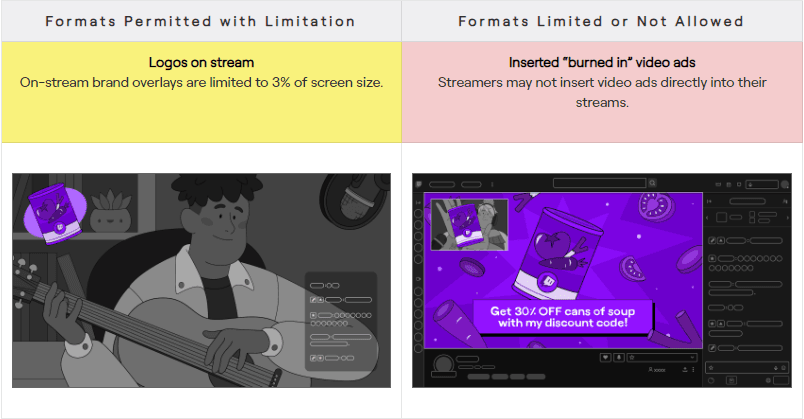Twitch is changing its content guidelines, forcing content creators into a precarious position when it comes to their sponsors.
Expect to see ads and promotions commanding less of your screen space next time you tune into Twitch. Announced today as part of a revamp for branded content, Twitch content guidelines have brought about new rules meant to curb unapproved advertisements. The changes to branded content policy went live today and change a number of stipulations on what is and isn't allowed by the site's terms of service.
This includes how large an on-screen ad can be, whether or not "burn-in" ads--video ads inserted directly into the stream via OBS or the overlay--are allowed, and more. And in typical fashion, the changes are making content creators none too happy.
Editor's note: Twitch has since commented on the goings-on:
Today’s branded content policy update was overly broad. This created confusion and frustration, and we apologize for that. We do not intend to limit streamers’ ability to enter into direct relationships with sponsors, and we understand that this is an important part of how streamers earn revenue. We wanted to clarify our existing ads policy that was intended to prohibit third party ad networks from selling burned in video and display ads on Twitch, which is consistent with other services. We missed the mark with the policy language and will rewrite the guidelines to be clearer. Thank you for sharing your concerns, and we appreciate the feedback. We’ll notify the community once we have updated the language.
Twitch content guidelines: Change for the better?

First off: What does branded content mean when it comes to Twitch guidelines? The following is what Twitch considers to be that territory:
- Product placements
- Endorsements
- Sponsored gameplay
- Paid product unboxings
- Channel sponsorships
- Branded channel panels
- Brand logo stream overlays
According to Twitch, branded content does not include wearing a t-shirt of a brand, showing equipment you've purchased yourself, or talking about restaurants in your community--the only examples given. Which is to say there's a lot of territory not covered when it comes to what is considered a promotion or advertisement. To help reduce confusion Twitch has created a disclosure tool for content creators, meant as a way to declare third-party support.
Twitch will not be enforcing the use of this tool until July of this year.
As for how those third-party brands may be advertised, Twitch is cracking down on what is allowed. "We recognize that streamers want to collaborate with brands, but as outlined in the Terms of Service we maintain the exclusive right to sell, serve, and display advertisements on the Twitch Services."
Here's the breakdown.
Formats permitted
- Branded panels on Channel Page
- Showcasing products in your stream background
- Including links to other sites that promote things
- Discussing, endorsing, or unboxing products or services
- Playing sponsored games
Formats permitted with limitations
- Logos on stream - On-stream brand overlays now limited to 3% of screen size.
Formats limited or not allowed
- Streamers may not insert video ads directly into streams via "burned in" ads
- "Burned in" display, audio ads
The reason for the change? Twitch content guidelines may potentially limit its own liability in regards to promotions it cannot control. Twitch can police something like an ad that goes into a panel, but less so for something like an overlay ad or an audio segment. Those only go noticed when reported or spotted by a moderator.
One lawyer covering the area of Twitch notes another reason for the new policies. Noah "MyLawyerFriend" Downs reported on a Medium post this afternoon that "Historically, Twitch has not really enforced any sort of formatting policy with regard to content creator sponsorships and endorsements."
Once more, this is all about FTC liability and how Twitch can look to protect itself with rules that similarly exist for its prime competition, YouTube Gaming. Downs further says "These Guidelines both restrict content creators in unprecedented ways and also likely have unintended and far-reaching consequences for Twitch, content creators, and sponsors alike."
The concern for content creators is how Twitch is looking to further restrict an already-unfriendly ecosystem for paid promotion. At the end of the day, Twitch wants its hands in the proverbial pie. Their changes do potentially help limit harmful advertisements from the likes of betting sites and illegal content.
And if we want to know how the top echelon of streamers feel, look no further than comment from Mr. Beast himself. "Hey Twitch, how about instead of handicapping what creators make, you help them make more? Seems more logical," he said in a Twitter post earlier today.
It also appears Twitch continues cutting off its own nose despite its face. Will this further push creators and viewers into the loving arms of YouTube or even Kick? Only time will tell.
Stay tuned to esports.gg for esports news and streaming culture info.
